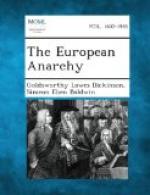“But why did Germany fear war? It must have been because she meant to make it.” So the English argue. But imagine the Germans saying to us, “Why do you fear war? There will be no war unless you provoke it. We are quite pacific. You need not be alarmed about us.” Would such a promise have induced us to relax our preparations for a moment? No! Under the armed peace there can be no confidence. And that alone is sufficient to account for the breakdown of the Anglo-German negotiations, without supposing on either side a wish or an intention to make war. Each suspected, and was bound to suspect, the purpose of the other. Let us take, for example, the negotiations of 1912, and put them back in their setting.
The Triple Alliance was confronting the Triple Entente. On both sides were fear and suspicion. Each believed in the possibility of the others springing a war upon them. Each suspected the others of wanting to lull them into a false security, and then take them unprepared. In that atmosphere, what hope was there of successful negotiations? The essential condition—mutual confidence—was lacking. What, accordingly, do we find? The Germans offer to reduce their naval programme, first, if England will promise an unconditional neutrality; secondly, when that was rejected, if England will promise neutrality in a war which should be “forced upon” Germany. Thereupon the British Foreign Office scents a snare. Germany will get Austria to provoke a war, while making it appear that the war was provoked by Russia, and she will then come in under the terms of her alliance with Austria, smash France, and claim that England must look on passively under the neutrality agreement! “No, thank you!” Sir Edward Grey, accordingly, makes a counter-proposal. England will neither make nor participate in an “unprovoked” attack upon Germany. This time it is the German Chancellor’s turn to hang back. “Unprovoked! Hm! What does that mean? Russia, let us suppose, makes war upon Austria, while making it appear




